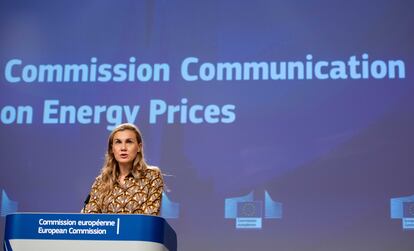Brussels reacts coolly to Spain’s proposal for curbing high energy prices
France, Greece and Hungary show a positive response to the plan but the EU Commission is unwilling for the moment to make significant changes to the existing system

An emergency meeting of European Union energy ministers on Tuesday poured cold water on Spain’s request for freedom to set electricity prices independently from soaring global gas prices.
The EU Commissioner for Energy, Kadri Simson, said after the meeting in Luxembourg that it is “not clear” that Spain’s proposal would be better than the current design of the European electricity market.
Spain and France have been pushing for reforms to the EU energy market, such as decoupling electricity prices from the gas market to better reflect the role of nuclear energy and renewables in their own energy mix.
Spain had circulated a document on Monday stating that “in exceptional situations, member states must be allowed to adapt the composition of electricity prices to their own specific situations.”
The Spanish proposal discussed a new tool to “decouple” the high gas prices from the final energy price. “We want it to be a European-level reform due to the extraordinary circumstances,” said Spain’s secretary of state for energy issues, Sara Aagesen, after the Tuesday meeting.
However, Aagesen underscored that Spain is not seeking to unilaterally exit the European electricity market. “It would not make a lot of sense for us to act in isolation. We are asking for flexibility.” Spanish government sources insisted that their proposal is not “structural,” but tied to “this extraordinary moment.”
Gas vs renewables

Gas is the raw material used in combined-cycle power plants, which can be quickly fired up to meet a sudden surge in energy demand. Although gas only represents one-fifth of electricity production in Europe, it is setting the prices as global demand soars on the back of the Covid-19 recovery.
This system has pushed up electricity rates everywhere, including in Spain where considerable production from renewables could in theory offer consumers cheaper energy. Electricity wholesale prices surged more than 200% between January and September, driving up retail prices. And no let-up is expected at least until March of next year on a continent that is highly dependent on imported gas (see box below).
Going into the meeting, Aagesen said that “we are seeing how a very small percentage of the marginal pricing system [gas represents less than 20% of the energy mix] is offering Spain extremely high wholesale prices.” She also noted that despite Spain’s strong push for renewables, the current system does not let consumers benefit from the lower cost of these technologies.
Reaction by other countries
Aagesen added that the Spanish proposal has been met with “a positive response” from France, Greece and Hungary.
But nine EU members, including Germany, Austria, the Netherlands and Finland backed a statement opposing any major changes to the system. “We cannot support any measure that conflicts with the internal gas and electricity market, for instance, an ad hoc reform of the wholesale electricity market,” said the statement, released on Monday. “This will not be a remedy to mitigate the current rising energy prices linked to fossil fuels markets.”
Commissioner Simson said that the EU executive would in any case review Spain’s proposal, while alerting about the risks of creating “a parallel market.” The EU is instead proposing a “toolbox” with short-term measures to weather the situation, such as tax cuts and special rates for vulnerable households.
In Spain, the escalation of prices on the wholesale market has pressured the government – headed by a center-left coalition of the Socialist Party (PSOE) and junior partner Unidas Podemos – to take action to curb the cost of household energy bills.
Spanish minister visits Algeria over natural gas supply
By Francisco Peregil and Miguel Ángel Noceda
Spain’s minister for the Ecological Transition, Teresa Ribera, is due to travel to Algeria on Wednesday to meet with authorities and find a solution to the closure of the Maghreb-Europe Gas Pipeline (MEG) that runs through Morocco. The pipeline supplies Spain, Portugal and Morocco with natural gas, but the 25-year supply contract is ending and Algiers cut off diplomatic ties with Rabat in August.
Instead, Algerian authorities said they will channel natural gas to Europe through their other pipeline, Medgaz, inaugurated in 2011 and linking the gas fields of Hassi R’mel directly with the Spanish city of Almería. The problem for Spain is ensuring that Medgaz will supply the same amount of gas as GME did, and which accounted for a third of Spain’s electricity consumption.
Tu suscripción se está usando en otro dispositivo
¿Quieres añadir otro usuario a tu suscripción?
Si continúas leyendo en este dispositivo, no se podrá leer en el otro.
FlechaTu suscripción se está usando en otro dispositivo y solo puedes acceder a EL PAÍS desde un dispositivo a la vez.
Si quieres compartir tu cuenta, cambia tu suscripción a la modalidad Premium, así podrás añadir otro usuario. Cada uno accederá con su propia cuenta de email, lo que os permitirá personalizar vuestra experiencia en EL PAÍS.
¿Tienes una suscripción de empresa? Accede aquí para contratar más cuentas.
En el caso de no saber quién está usando tu cuenta, te recomendamos cambiar tu contraseña aquí.
Si decides continuar compartiendo tu cuenta, este mensaje se mostrará en tu dispositivo y en el de la otra persona que está usando tu cuenta de forma indefinida, afectando a tu experiencia de lectura. Puedes consultar aquí los términos y condiciones de la suscripción digital.








































